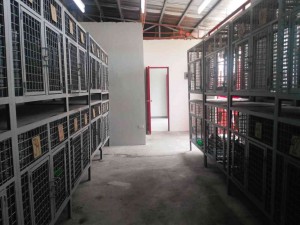
AT LEAST 80 cages are ready to hold stray animals at the newly renovated pound operated by the local government in Barangay Bagumbayan South, Navotas City.
Navotas City has put more bite into efforts to rid the streets of stray dogs and cats.
The local animal pound was reopened on Tuesday after undergoing a P2.2-million renovation. The refurbished 80-square meter facility on Tioco Street, Barangay Bagumbayan South, has space for at least 80 cages, a veterinary office, an isolation room for sick animals, and a euthanasia room.
But careless pet owners be warned: Should their wandering animals be caught and end up in the pound, they will have to pay P250 to get them back and P50 for every day they had spent in the pound. The first payment is their penalty for letting their pets go astray in violation of a city ordinance; the second covers the cost of food and other provisions that went into their care, officials said.
The pound was established in 2006 following the passage of the ordinance that sought to address residents’ concerns about animals roaming the streets, posing the threat of rabies or befouling neighborhoods with their waste, according to Joebe Gonzales, chief of the city’s agriculture office.
Meeting gov’t standards
The nine-year-old structure was given a makeover recently to meet the standards of the Bureau of Animal Industry (BAI), Gonzalez said.
In October last year, the old pound came under criticism from animal welfare advocates after a GMA news report found it in a wretched state, with the cages filthy and the animals ill-fed.
But Navotas Mayor John Rey Tiangco, who graced Tuesday’s reopening, explained that the report caught the place to be in such “dilapidated” conditions mainly because the footage was taken right after a typhoon.
“It was really up for renovation and we already had a schedule and a budget for it (even before the report came out),” Tiangco said. “Now I hope it passes BAI standards.”
He said more improvements would be done on the facility’s drainage and exhaust systems.
3 days to reclaim pets
Cheney Gabriel, a biologist at the city agriculture office, said about 6,000 households in Navotas keep pets, and that 200 stray animals were captured across the city, mostly in slum
PET OWNERS have to pay P250 to reclaim their animals as penalty for violating a city ordinance on stray animals and an additional P50 per day spent in the pound to cover food and other expenses.
areas, last year alone.
The local government currently employs four animal catchers, who track down strays using motorcycles fitted with cages to access narrow alleys.
Owners of captured animals have three days to reclaim them. They can call 2837415 or go to the city agriculture office to inquire if their pets have been caught and brought to the pound.
The City Treasurer’s office collected P12,000 last year from owners who reclaimed their pets. They included “parents who were forced to pay to pacify crying children who missed their pets,” Gabriel said.
Sad end for 100
For animals that remain unclaimed, the agriculture office posts “adoption notices” in barangays and may soon use the social media as well for this purpose, Gabriel said. Measures are in place to check if the interested party is not into the “dog meat trade,” she added.
Under the ordinance, animals not claimed or adopted after a week are to be euthanized. But Gabriel said they have relaxed this rule and instead wait for the unclaimed animals to reach a big number before they put them to sleep.
About 100 pets—all dogs—met that fate last year. They were first given Zoletil (an injectable anesthetic) to make them groggy, and then a shot of potassium in their hearts.
The dead animals were then brought by boat to a dump in Barangay Tanza, where they were buried.